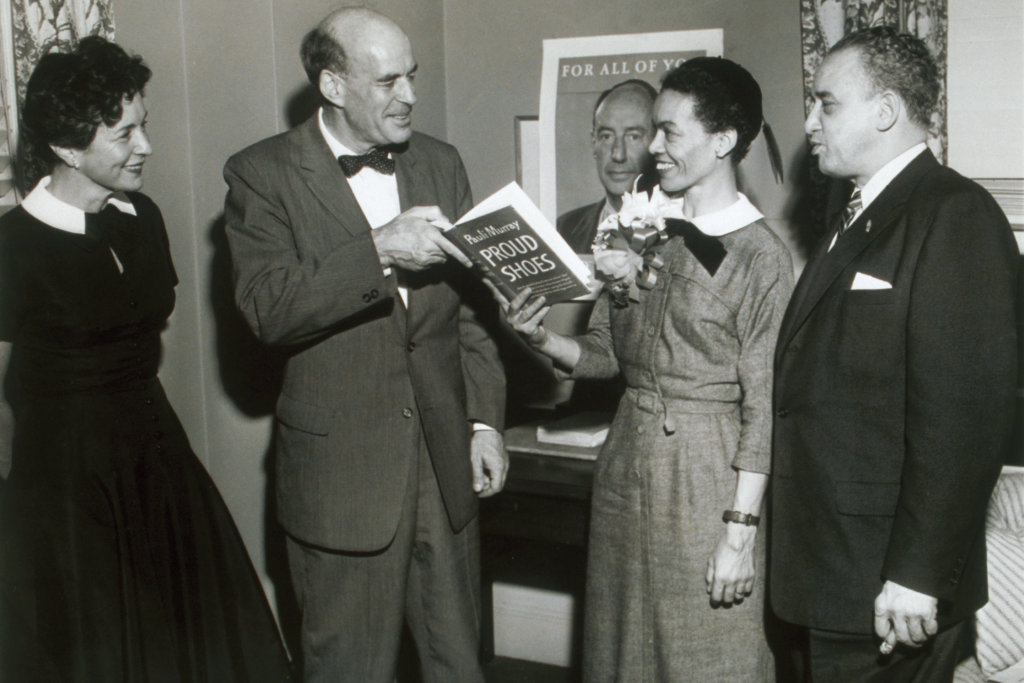Learning Objective:
Students explore the role of Pauli Murray's fashion and its relationship to gender identity and expression.
Students analyze Murray’s poetry and quotes and their connections to themes of race, gender, and inequality, examining how Murray used literary expression to challenge social injustices.
Key Civics Themes:
-
Rights and Responsibilities: What rights do individuals have to self-expression, and how have those rights changed over time? Consider Supreme Court cases such as Tinker v. Des Moines (1969), Masterpiece Cakeshop v. Colorado Civil Rights Commission (2018), and Mahanoy Area School District v. B.L. (2021).
-
Suggestion for additional learning: UnErasing LGBTQ History and Identities Podcast, Season 6, Episode 1: What Is Speech? https://podcasts.apple.com/us/podcast/season-6-ep-1-what-is-speech/id1595199443?i=1000685227542
-
-
Role of the Individual: Identify passages from Murray’s poetry that provide evidence of Murray's efforts to challenge injustice. How can one individual’s voice help to shape public discourse?
-
Power and Politics: Students research and create a timeline of how clothing has been used to challenge power structures, or as a form of protest. (e.g. 19th-century masquerade laws, Suffragettes wearing white, Black Panther Party jackets and berets, Hilary Clinton’s pantsuits, etc). How does clothing communicate political messages?

Photo Credit: Harvard Radcliffe Institute, Schlesinger Library
Activities:
-
Photo analysis of the different ways Pauli presented themselves at different times in their life (images and downloadable files below). Using these photographs of Murray from different points in their life, have students describe how Murray's evolving identity showcases the struggle for self-definition in a society that often enforces rigid norms.
-
Listen to this audio clip of Pauli Murray discussing poetry, from an interview with Genna Rae McNeil, February 13, 1976, for the Southern Oral History Project, University of North Carolina.
CLICK HERE to download the transcript.
Analyze the following quotes by Pauli Murray:
"I speak for my race and my people — The human race and just people." - Pauli Murray
"Then let the dream linger on, and that's the dream of freedom. Let it be the test of nations. Let it be the quest of all our days, the fevered pounding of our blood, the measure of our souls that none shall rest in any land and none return to dreamless sleep. No heart be quieted, no tongue be stilled until the final man may stand in any place and thrust his shoulders to the sky, friend and brother to every other man." - Final stanza in "Dark Testament" by Pauli Murray
"To The Oppressor" by Pauli Murray, published in Dark Testament and Other Poems (1939).
Now you are strong
And we are but grapes aching with ripeness.
Crush us!
Squeeze from us all the brave life
Contained in these full skins.
But ours is a subtle strength
Potent with centuries of yearning,
Of being kegged and shut away
In dark forgotten places.
We shall endure
To steal your senses
In that lonely twilight
Of your winter’s grief.
PHOTO ANALYSIS
All photos are from Harvard Radcliffe Institute, Schlesinger Library










